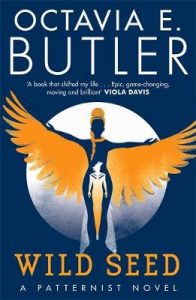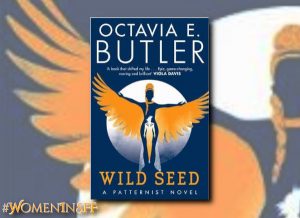WILD SEED by Octavia E. Butler (BOOK REVIEW)
“She shook her head. She knew now how the slaves had felt as they lay chained on the bench, the slaver’s hot iron burning into their flesh. In her pride, she had denied that she was a slave. She could no longer deny it. Doro’s mark had been on her from the day they met. She could break free of him only by dying and sacrificing her children and leaving him loose upon the world to become even more of an animal.”
Wild Seed (1980) is the first book in Octavia E. Butler’s Patternist series, according to internal chronology. She wrote the book second to last, after already having written Patternmaster (1976), Mind Of My Mind (1977) and Survivor (1978). In a rare case of the prequel being better than the original, Wild Seed is the high point of the Patternist series and one of Butler’s finest achievements. Coming out a year after Butler had released the standalone novel Kindred (1979), a powerful work which sends modern day African American woman Dana back in time to a pre-Civil War plantation where she experiences the horrors of slavery first-hand, Wild Seed further explores slavery, power dynamics and what kinds of relationships can exist between the two. These are themes close to Butler’s heart, that she would return to in her Xenogenesis books, and Wild Seed also paves the way for some of the more radical explorations of sex and gender that drive that later trilogy as well. Wonderfully imagined, epic in scope, and featuring some of Butler’s most indelible characters, Wild Seed is both a highlight of Butler’s own backlist and of the speculative fiction genre as a whole.
 Wild Seed is the story of Anyanwu, an immortal African woman who can change shape and heal herself and others. She is discovered by Doro, an ancient bodyswapping being who has been carefully breeding people with special abilities for thousands of years. Doro sees Anyanwu as a wild seed, a genetic source of new and exciting abilities to bring to his people. Seduced by Doro’s charms and frightened that he might prey on her children, Anyanwu agrees to go with him. Leaving behind her home in Africa, she finds herself brought across the Atlantic on a slave ship to one of Doro’s secluded colonies of people with extraordinary abilities in upstate New York. Doro’s people have a range of superhuman and psychic abilities, but none of them have anything as powerful as Anyanwu’s shapeshifting and healing abilities, or her unnaturally long life. Yet even as she begins to become an essential part of this community, Anyanwu discovers the true extent of Doro’s monstrousness – he is a manipulative monster who consumes people’s souls and wears their bodies. Over the next four hundred years, Doro tries to control, manipulate and break Anyanwu, whilst Anyanwu tries to resist, break his control over her descendants and escape.
Wild Seed is the story of Anyanwu, an immortal African woman who can change shape and heal herself and others. She is discovered by Doro, an ancient bodyswapping being who has been carefully breeding people with special abilities for thousands of years. Doro sees Anyanwu as a wild seed, a genetic source of new and exciting abilities to bring to his people. Seduced by Doro’s charms and frightened that he might prey on her children, Anyanwu agrees to go with him. Leaving behind her home in Africa, she finds herself brought across the Atlantic on a slave ship to one of Doro’s secluded colonies of people with extraordinary abilities in upstate New York. Doro’s people have a range of superhuman and psychic abilities, but none of them have anything as powerful as Anyanwu’s shapeshifting and healing abilities, or her unnaturally long life. Yet even as she begins to become an essential part of this community, Anyanwu discovers the true extent of Doro’s monstrousness – he is a manipulative monster who consumes people’s souls and wears their bodies. Over the next four hundred years, Doro tries to control, manipulate and break Anyanwu, whilst Anyanwu tries to resist, break his control over her descendants and escape.
Wild Seed asks the question, what forms of resistance are available to people when they have their agency removed? Doro is so powerful, and able to wreak such terrible revenge on anyone who crosses him, that even a being as powerful as Anyanwu is unable to stand against him. The situation she finds herself in is analogous to that of African American slaves in the United States, the power differential so huge it is impossible to navigate. Butler explores the different ways in which Anyanwu is able to subvert Doro’s control, to offer healing and kindness in contrast to the violence and pain he uses to get his way. Anyanwu manages to find love with one of Doro’s sons, Isaac, but the novel never forgets that, for all that Isaac genuinely loves Anyanwu, he is part of a system of abuse and dominance that she is trapped in. Anyanwu and Isaac’s sincere attempts to make their relationship work throughout these power differentials is contrasted with Doro’s open abusiveness. Doro is one of fiction’s most horrifying and frightening characters. He uses his charisma, his psychic powers, and sexual violence to manipulate people into giving him what he wants. He is every abusive partner, every abusive system personified. The novel’s intensity and believability means that it shades into horror at times, and Butler is unafraid to explore the depths of her characters’ darkness.
Wild Seed is also a celebration of posthuman embodiment. Anyanwu and Doro both subvert ideas around gender binaries. Anyanwu can change into a man or a woman at will, and fathers children as well as giving birth to them. Doro inhabits bodies across a range of ethnicities and genders, frequently choosing them based upon what would be most useful to him in a particular social situation. Both of them retain their core identity, no matter what their physical appearance at any given time. Whilst Doro is quite cavalier about wearing bodies and throwing them away, Anyanwu’s powers are all related to her embodiment. Her ability to shapeshift and heal are based on her deep understanding of her body on a cellular level. In order to heal, she must understand the nature of injuries and infections to correct them and fight them off. In order to change into an animal, she must know and understand how its body works.
Butler’s book deals with heavy themes of abuse, attempted suicide, slavery and madness. It comes to an appropriately troubling ending, with Anyanwu having to decide how much she will compromise herself for the safety of her children, how much the good she can do in helping and healing Doro’s children outweighs the suffering she is enabling by assisting Doro in his breeding programme. Yet in its celebration of posthumanism and its imagining of different ways of being and existence, the novel hints at a more positive future. Even if she cannot break Doro’s sadistic hold, perhaps one of Anyanwu and Doro’s descendants will.

